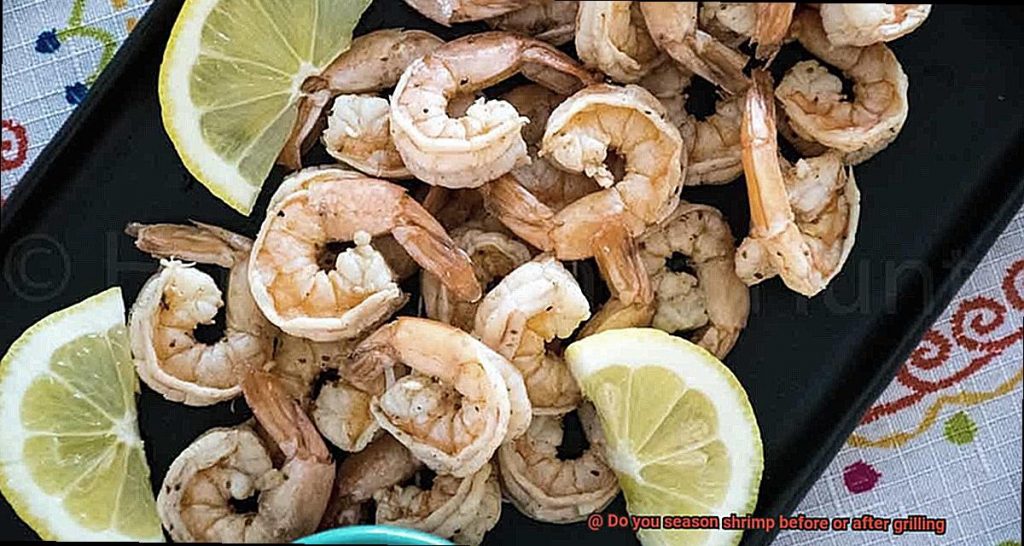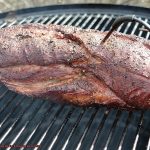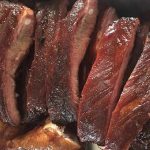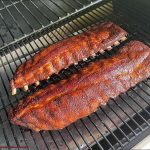Ah, shrimp. The succulent seafood that’s beloved by millions worldwide. Grilling it takes this delicacy to a whole new level of deliciousness. But before you fire up the grill, there’s a debate among seafood enthusiasts on whether to season your shrimp before or after grilling. It may seem like a minor detail, but it can make all the difference in taste and texture.
So, what’s the verdict? Well, it largely depends on your personal preference and the type of seasoning you’re using. In this blog post, we’ll explore both options and help you decide which one is best for you.
If you want a more subtle flavor, seasoning your shrimp before grilling might be the way to go. This allows the seasoning to soak into the shrimp and develop a flavorful marinade. However, if you prefer juicier and firmer shrimp, then seasoning after grilling is your best bet as it helps preserve moisture.
But wait. There’s more to consider than just when to season – what type of seasoning should you use? That’s an important factor in getting that perfect grilled shrimp taste. We’ll dive into those details too.
So whether you’re a seasoned pro or just starting out with grilling shrimp, we’ve got all the tips and tricks to help you get that mouth-watering flavor just right.
Contents
What is Grilling Shrimp?
Grilling shrimp is a culinary art that involves cooking these tender crustaceans over an open flame to achieve a perfectly charred exterior and a succulent, juicy interior. It is a healthy and delicious way to enjoy this seafood delicacy while adding a burst of flavor to your meals.
Before grilling shrimp, it’s crucial to ensure that they are properly cleaned and deveined. This can be done by rinsing them under cold water and removing the shell and tail. Leaving the tail on can elevate the presentation of your dish, giving it an elegant touch.
When it comes to seasoning shrimp for grilling, there are endless possibilities. Popular options include garlic, lemon, herbs, and spices. It’s essential to choose ingredients that complement the natural sweetness of the shrimp without overpowering it. If using a dry rub or marinade with high salt content, opt to season the shrimp before grilling. However, if you’re using a seasoning prone to burning, like sugar or honey-based marinades, add them after grilling.
One of the vital things to keep in mind when grilling shrimp is to cook them briefly as they cook quickly. Usually, only taking a few minutes per side is enough. Overcooking can result in tough and rubbery shrimp, making them unpalatable. Therefore, it’s important to keep an eye on them as they grill.
Grilled shrimp can be cooked in various ways – on skewers, in foil packets, or directly on the grill grates. When seasoning before grilling, ensure that each shrimp is evenly coated with the seasoning for a balanced flavor profile. However, if you prefer to grill directly on the grill grates, seasoning after cooking allows you to taste and adjust the seasoning as needed.
Should You Season Shrimp Before or After Grilling?
As an expert in all things seafood, I’m here to help you navigate this culinary maze.
The first thing to consider is the type of seasoning you plan to use. If you’re using a dry rub or spice mix, then it’s best to season your shrimp before grilling. This will allow those delicious flavors to penetrate the meat and infuse it with a mouth-watering taste. However, if you’re using a wet marinade, then it’s best to wait until after grilling to season your shrimp. This is because marinades can easily burn on the grill and leave a bitter aftertaste.
Another factor to consider is the cooking method. For example, if you’re grilling shrimp skewers, then it’s best to season the shrimp before threading them onto the skewers. This ensures that each shrimp is evenly coated with seasoning for maximum flavor impact. On the other hand, if you’re grilling shrimp on a grill basket or directly on the grill grates, then it’s best to season them after grilling. This prevents any seasoning from falling through the grates and burning, resulting in a lackluster flavor.
When it comes to seasoning grilled shrimp, less is often more. Shrimp have a delicate flavor that can be easily overpowered by strong spices and seasonings. A simple combination of salt, pepper, and lemon juice can be enough to enhance the natural sweetness of the shrimp without overwhelming it.
To summarize, whether you choose to season your shrimp before or after grilling depends on factors such as the type of seasoning and cooking method used. By keeping these things in mind and using a light hand when it comes to seasoning, you’ll be well on your way to delicious grilled shrimp that will leave your taste buds singing.
Benefits of Seasoning Shrimp Before Grilling
Not only does it elevate the flavor, but it also guarantees that every bite is packed with delectable goodness.
Let’s delve into the benefits of seasoning shrimp before grilling. First and foremost, we have the enhanced flavor. Shrimp is a delicate protein that requires a gentle touch. By seasoning before grilling, you’re adding a layer of flavor that complements the natural sweetness of the shrimp. Whether you opt for a simple salt and pepper blend or an exquisite mix of spices, the possibilities are endless.
Next on the list, we have uniform seasoning. Have you ever seasoned your shrimp after grilling only to find some pieces were over-seasoned while others were under-seasoned? It’s a common problem that can be avoided by seasoning before grilling. By doing so, you ensure that every piece is evenly coated with the spices.
Moreover, seasoning before grilling can also help tenderize the shrimp. Certain seasonings, such as citrus-based marinades or pineapple juice, work wonders in making the shrimp tender and juicy. This not only improves the texture but also enhances the overall flavor profile.
Last but not least, we have time-saving. Seasoning before grilling allows you to marinate the shrimp for a few minutes or even hours before cooking. This means that when it’s time to grill, everything is ready to go, and there’s no need to pause and season each individual piece.
Benefits of Seasoning Shrimp After Grilling
Shrimp is a delicate protein that requires just the right amount of seasoning to enhance its natural flavors without overpowering them. While some may argue that seasoning shrimp before grilling is the way to go, many experts suggest seasoning the shrimp after grilling for optimal results.
One of the most significant benefits of seasoning shrimp after grilling is that it allows the natural sweetness and delicate taste of the shrimp to shine through. By avoiding seasoning before cooking, you can avoid overshadowing the unique flavors of the shrimp and provide a more enjoyable dining experience.
Another essential advantage of seasoning shrimp after grilling is that it helps prevent overcooking. Shrimp can easily become rubbery and tough if overcooked, but by seasoning it after grilling, you can avoid this pitfall and ensure that your shrimp remains tender and juicy.
Furthermore, seasoning shrimp after grilling provides more control over the flavor profile. You can taste the shrimp first and then add seasonings that complement its natural flavor. This way, you can adjust the seasoning to your liking and ensure that each bite is flavorful and satisfying.
If you’re looking to take your grilled shrimp game to the next level, consider some of these additional benefits of seasoning after grilling:
- It saves time: You don’t have to worry about pre-seasoning the shrimp before cooking, which can be time-consuming.
- It’s more versatile: By seasoning after grilling, you can experiment with different flavor profiles and find combinations that work best for you.
- It’s healthier: By avoiding marinades or dry rubs before cooking, you can reduce your intake of sodium and other additives.
Tips for Applying Dry Rubs and Marinades to Shrimp
The first step to applying a delicious seasoning to your grilled shrimp is understanding the difference between dry rubs and marinades. Dry rubs consist of a combination of herbs and spices that are rubbed directly onto the shrimp before grilling, while marinades involve soaking the shrimp in a liquid mixture for a period of time before cooking.
Both methods have their own unique benefits. Dry rubs offer a quick burst of flavor, while marinades allow the flavors to penetrate the meat more deeply. Experiment with both methods to find your preferred flavor profile.
Ensure Your Shrimp is Dry
Before applying any seasoning, it’s important to ensure that your shrimp is completely dry. This will help your seasoning stick to the shrimp evenly and prevent it from sliding off during cooking.
To ensure that your shrimp is dry, pat it down with paper towels before seasoning. If you’re using a marinade, make sure to pat it down again after removing it from the liquid to prevent any excess liquid from dripping onto the grill.
Timing is Key
Timing is everything when it comes to seasoning your shrimp. When using a dry rub, apply it at least 30 minutes before grilling to allow the flavors to penetrate the shrimp. On the other hand, most marinades require at least 30 minutes to an hour of soaking time, but some recipes may call for longer.
It’s essential to follow recipe instructions closely when using a marinade and not over-marinate, as this can result in a mushy texture. Be sure to monitor your timing closely for the best results.
Select Your Flavors Carefully
When choosing a dry rub or marinade, consider the flavor profile you want to achieve. For example, if you’re looking for a spicy kick, add cayenne pepper or chili powder. If you prefer a sweeter flavor, try adding honey or brown sugar.
Experiment with different spice blends and marinade recipes to find your perfect combination. Always start with fresh, high quality shrimp for the best results.
Eliminate Excess Marinade
Before grilling your shrimp, it’s crucial to remove any excess marinade. This can be achieved by shaking off any excess liquid or patting the shrimp dry with paper towels.
Leaving excess marinade on the shrimp can cause flare-ups on the grill and uneven cooking. Take the time to remove any excess liquid before grilling to ensure that your shrimp cooks evenly and has a delicious flavor.
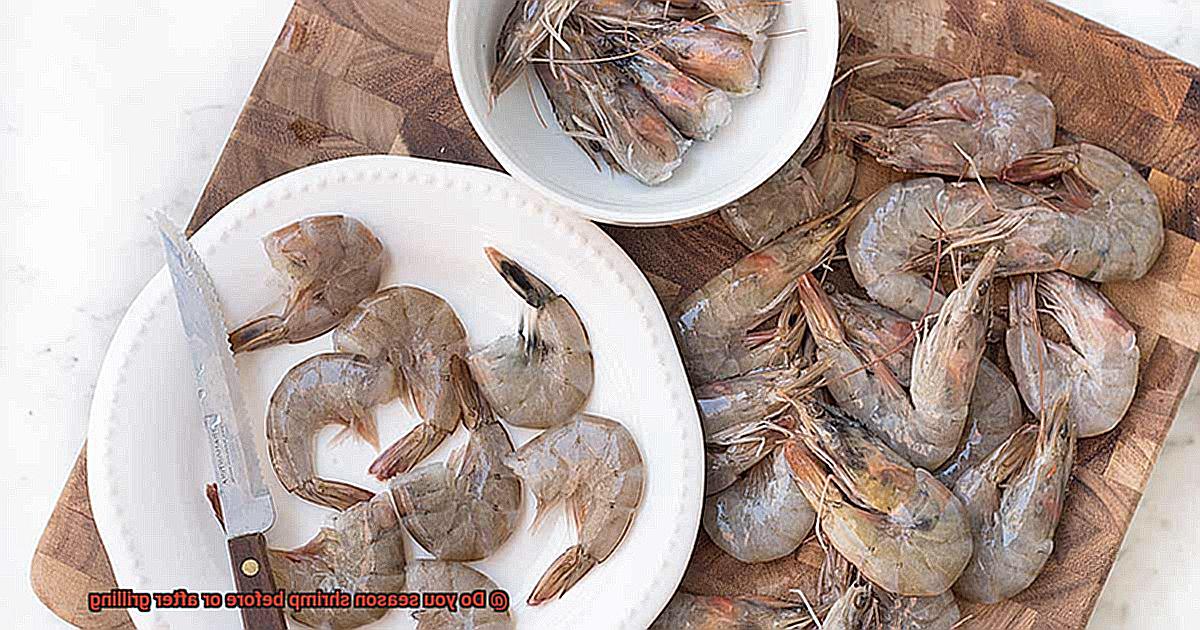
Factors to Consider When Deciding Whether to Season Before or After Grilling
Grilling shrimp is a delightful way to enjoy this seafood delicacy. However, the question of whether to season before or after grilling can be a bit perplexing. Fortunately, there are several factors to consider that can help you make the right decision.
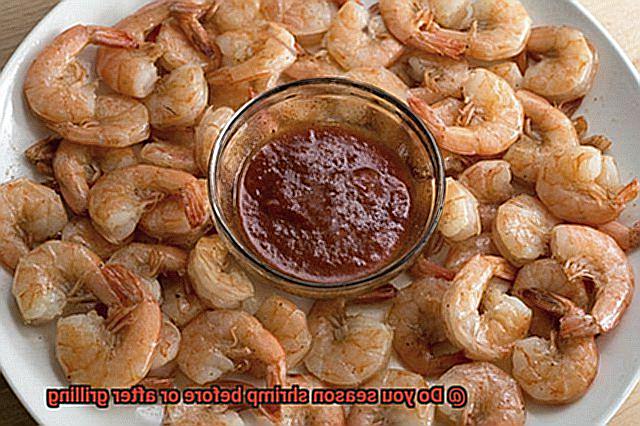
Firstly, the type of seasoning you plan to use plays a significant role. Dry rubs with salt create a crust on the surface and draw out moisture, making it best to season before grilling. Conversely, marinades with citrus or vinegar can break down protein in the shrimp, making it better to season after grilling.
The cooking method is another factor that influences seasoning. Seasoning shrimp before grilling on skewers ensures even distribution of flavor. However, when using a grill basket or cooking directly on the grill grates, it’s better to season after grilling to prevent the seasoning from falling off.
Size and shape also play a role in determining when to season shrimp. With larger shrimp that require more time to cook and absorb flavors, it’s best to season before grilling. On the other hand, smaller shrimp cook quickly and can easily become over-seasoned if seasoned before grilling.
Lastly, personal preference is an essential consideration when deciding how to season your grilled shrimp. Some people prefer unseasoned grilled shrimp, while others enjoy bold and flavorful seasoning. Experimentation helps determine what works best for individual taste buds.
Different Ways to Grill Shrimp
When it comes to grilling shrimp, the possibilities are endless. There are many different methods for cooking shrimp, each with their own unique advantages. Here are five popular methods for grilling shrimp:
Skewering Shrimp
Shrimp skewers are a great way to add some variety to your grilling routine. You can easily mix and match different types of shrimp with vegetables or other ingredients for a colorful and tasty dish.
Thread the shrimp onto skewers along with any other ingredients you choose, then grill them over medium-high heat until they are cooked through. The key to perfectly grilled skewers is to soak the skewers in water for at least 30 minutes beforehand to prevent them from burning.
Using a Grill Basket
If you want to cook large batches of shrimp at once, using a grill basket is the way to go. The basket allows you to easily flip and move the shrimp around without worrying about them falling through the grates.
Place the shrimp inside the basket and grill them over medium-high heat until they are cooked through. For even more flavor, toss the shrimp in a marinade or spice rub before placing them in the basket.
Grilling Directly on the Grates
For a more hands-on approach, you can grill shrimp directly on the grates. This method allows you to achieve a nice char on the shrimp, giving them a delicious smoky flavor. Brush the shrimp with oil or butter and place them on the grates over medium-high heat.
Be sure to keep an eye on them, though, as they can cook quickly and become overdone if left unattended.
Grilling in a Foil Packet
Grilling shrimp in a foil packet is a foolproof way to ensure juicy and flavorful results. This method allows for the shrimp to cook in their own juices, creating a delicious and tender dish.
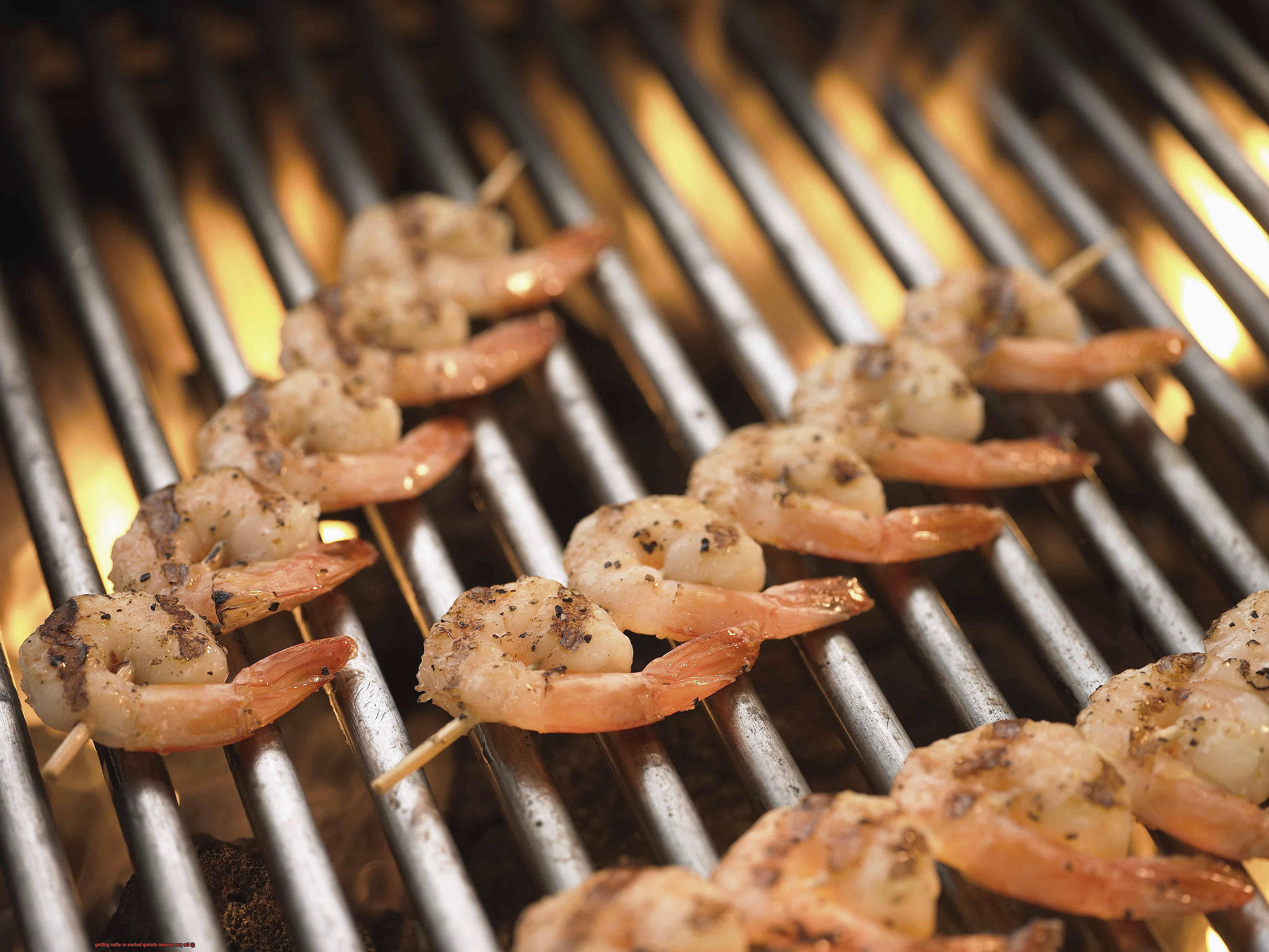
To do this, place the seasoned shrimp in a foil packet and grill them over medium-high heat until they are cooked through. You can also add vegetables or other ingredients to the packet for a complete meal.
Properly Seasoning Shrimp
Regardless of which method you choose, it’s important to properly season your shrimp before grilling. For best results, marinate the shrimp for at least 30 minutes before grilling to allow the flavors to fully penetrate the meat.
You can use a store-bought marinade or make your own using olive oil, lemon juice, garlic, and herbs. Alternatively, you can simply season the shrimp with a simple blend of salt and pepper or a more complex spice rub.
Experimenting with Different Flavors and Techniques
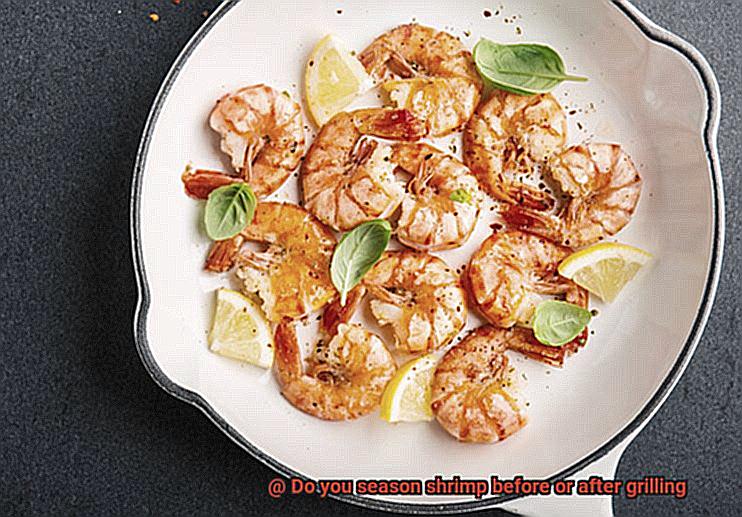
It’s time to take your taste buds on a flavorful journey by experimenting with different flavors and techniques. As an expert in this field, I’m thrilled to share some tips and tricks that will elevate your grilled shrimp game.
Marinating your shrimp is a popular and effective technique that not only adds flavor but also tenderizes the shrimp. Combine herbs, spices, and liquids like olive oil, vinegar, or citrus juice to create a marinade that will make your shrimp succulent and juicy. Let the shrimp soak in this mixture for a period of time before grilling to ensure maximum flavor.
If you prefer dry seasoning options, try using a rub. A rub is a mixture of herbs, spices, and sometimes sugar that is rubbed onto the surface of the shrimp before grilling. This technique enhances the natural flavor of the shrimp while adding a layer of seasoning that complements it. Experiment with different rub combinations to find the perfect flavor that suits your taste.
When it comes to flavor combinations, there are endless possibilities. Some popular flavors to try include garlic, lemon, lime, chili, and cumin. Mix and match these flavors to create unique profiles that will impress your guests.
In addition to seasoning, the cooking technique used can also affect the flavor of the shrimp. Grilling on high heat will give the shrimp a smoky flavor, while grilling on lower heat will result in a more delicate flavor. Experimenting with different cooking techniques will help you find what works best for you.
ZHp-VmvqLQk” >
Conclusion
In the world of grilling, shrimp is a delicate but delicious seafood that requires careful consideration when it comes to seasoning. The age-old debate of whether to season before or after grilling largely depends on personal preference and the type of seasoning used. Dry rubs are best applied before grilling, while wet marinades are better applied after grilling to prevent burning.
When it comes to cooking methods, there are various options that can impact the flavor profile of your grilled shrimp. Skewering shrimp ensures even distribution of flavor, while using a grill basket allows for larger batches. Grilling directly on the grates gives a smoky flavor, while cooking in a foil packet creates a juicy and flavorful dish.
But let’s not forget about the star of the show: seasoning. Marinating the shrimp tenderizes and adds flavor, while dry rubs enhance the natural sweetness of the seafood. Experimenting with different flavors like garlic, lemon, chili, and cumin can lead to unique profiles that will impress guests.
Ultimately, there is no right or wrong way to season your grilled shrimp – it all boils down to personal preference and experimentation. With these tips and tricks in mind, you can elevate your grilled shrimp game and enjoy this succulent delicacy in all its mouth-watering glory.

